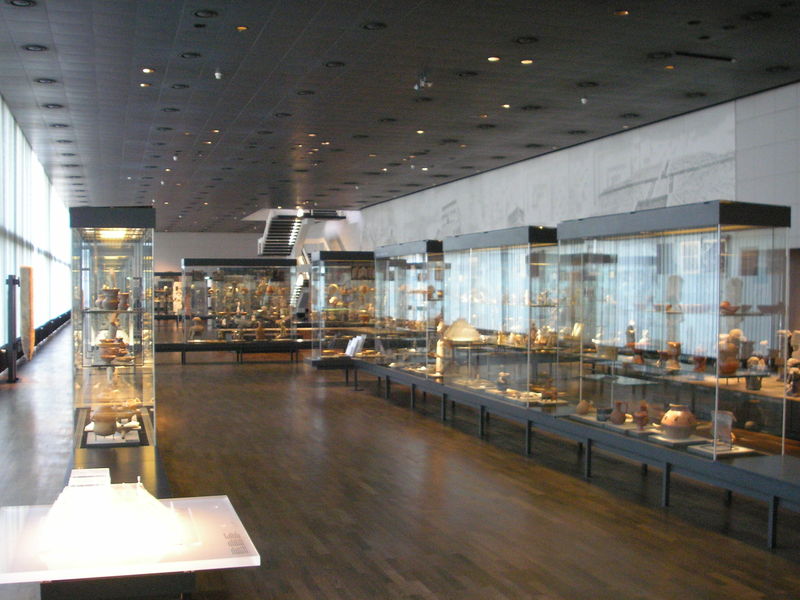Article that Accuses Peruvian Doctor of Having Helped Loot Machu Picchu Questioned
posted on July 20th, 2008 in Andes Mountains, Archaeology, Did a German Discover Machu Picchu?, Incas, Machu Picchu, Peru, Recent Discoveries
An Antiquities Gallery within the Ethnological Museum of Berlin
SOMOS
(El Comercio)
July 12, 2008
By Dr. Federico Camino Macedo
(Translated by Kim MacQuarrie)
The article in SOMOS 1125 [June 28, 2008, in El Comercio] referred to José Macedo as an ignorant criminal who colluded with the German August R Berns in the sacking, looting, and commercialization of the treasures of Machu Picchu. In reality, the former is Doctor Mariano José Macedo Cazorla (born in Ayaviri in 1823; died in Lima in 1894), a prestigious medical doctor who introduced the study and scientific treatment of epidemics to Peru and who, according to Carlos Enrique Paz Soldán, was “the greatest hygienist of his time” (La Vida y Obra de Mariano José Macedo; Lima, 1945, page 48)…
Macedo was in 1884 one of the founders of the Free Peruvian Academy of Medicine; he was a professor on the Faculty of Medicine and was a great connoisseur of ancient Peru, as is attested to by his correspondence in 1884 with the International Congress of Americanistas in Copenhagen, as well as by the Catalogue of Peruvian Archaeological Objects of the Ancient Inca Empire, Paris, 1881, which contains a detailed description of his Peruvian antiquities collection.
Doctor Macedo was not a trafficker in antiquities but was rather an astute collector who amassed in his house-museum at 209 Bolivar Plaza in Lima two thousand pre-Colombian objects, from ceramics and mummies to gold mantles and objects of silver. The Chilean occupation forced him to sell his collection to the Ethnological Museum of Berlin in order to prevent it from falling into enemy hands and because the taxes he had had to pay had economically ruined him.
A man named Mr. Kruger was in charge of the sale. Doctor Carlos Enrique Paz Soldán wrote that “in London, Vienna, Paris, Madrid and Berlin everyone is talking about the Macedo exhibition. Despite the pain that it caused Macedo, the transfer of the collection to the Ethnographic Museum of Berlin was as valuable as a monument erected in his memory. In effect, the ‘Macedo Room’ was for years the richest one in the world” (op. cit. page 20). That collection, in an age in which nobody was interested in its links with ancient Peru, was the result of decades of patient work and acquisitions.
A note in the front of the catalogue explained the origin of his [Macedo’s] collection and listed the people who had sold him objects that had come from all of Peru’s archaeological zones that were known at that time, as he himself indicated and not, as it says in the SOMOS article, pieces that “were looted from Machu Picchu.” The author of the [SOMOS] article who motivated this reply recommends going to the Ethnological Museum of Berlin in order to “find” this Treasure that has been illegally taken “from Peru.” For decades the collection has been displayed in the aforementioned “Macedo Room” and it was obviously never a secret that the collection had belonged to Doctor José Mariano Macedo.
The article that I am referring to ignores the context, consequently committing historical errors that make [the author] issue reckless judgments (“…a list of everything stolen,” “…a company that looted such goods”). Can the Peruvian government make a claim against the Ethnological Museum of Berlin for the collection? The purchase of the collection was as legitimate as was its sale, even though we now can regret it.
Reply from SOMOS:
We thank professor Federico Camino for his clarifications, but we must also clarify that SOMOS never called a doctor of such stature and talent a “criminal” or “ignorant.” What is certain is that the destiny of a collection of someone who was surely very knowledgeable about Peru, was the Ethnological Museum of Berlin, in an age in which the national patrimony was negotiated with the consent of the highest authorities in the country, whose responsibility in this questionable policy is what this article criticized.
(Upcoming: Part 2 of an interview with the explorer, Paolo Greer)

